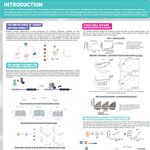German Cancer Research Center & University Heidelberg, Medical Faculty
BIOGRAPHY

MAY 19, 2022 8:00 AM PDT
Automated sample preparation for reproducible clinical proteomics
Sponsored by: Covaris, Inc.
Speakers
-
Nicolas Autret, PhD
Senior Business Development Manager, CovarisBIOGRAPHY -
Ignasi Forné, PhD
Technical Head of the Proteomics Facility, Biomedical Center of Ludwig Maximilian University in MunichBIOGRAPHY
Event Date & Time
Date: May 19, 2022
Time: 8:00am (PDT), 11:00am (EDT), 5:00pm (CEST)
Abstract
Mass spectrometry (MS)-based proteomic technologies are increasingly applied in a clinical context for disease classification and diagnostics, however their standardized use is still prevented by several bottlenecks in sample handling. Here, I will present how we integrated AFA-based ultrasonication in an automated proteomic workflow to enable routine, robust and comprehensive proteome analysis with minimal hands-on time. This can be applied to cells, fresh tissue and FFPE tissue, thus spanning the full range of clinical sample types and indicating universal utility. Moreover, 96 samples can be processed simultaneously, ensuring throughput under standardized conditions. Sensitivity of the approach will be shown from low-input experiments starting from 100-1000 cells. Data will be shown of the implementation of this pipeline to a cohort of 96 ependymoma tumor samples, where we integrated the obtained proteomic data with other omics layers allowing individualized molecular profiling and disease sub-classification.
Benefits of Adaptive Focused Acoustics for Proteomics Lab
Proteomics requires strategies capable of processing hundreds of samples in a robust and reproducible manner, independently of the origin of the material of interest. In this webinar I will show how the Proteomics Facility of the Biomedical Center at the University of Munich takes advantage of AFA-based ultrasonication to establish universal workflows that can be applied to the proteomic studies of diverse samples including FFPE, thrombi or low number of cells. The standardization, reproducibility and throughput of these workflows facilitated the analysis of large cohorts and provided our collaboration partners with proteomics data ready for clinical or biological interpretation and integration with other omics information.
Webinars will be available for unlimited on-demand viewing after live event.
You May Also Like
DEC 10, 2024 | 9:00 AM
To-date, proteomic analysis has been severely limited in scale and resolution. Analyzing protein samples using an intact, single-molecule approach holds th...
APR 21, 2025 | 1:00 PM
C.E. CREDITS
Routine coagulation assays are widely performed in laboratories and provide valuable information to the patient’s overall clinical picture. It’s important for laboratorians to kn...
Speaker:
Malissa S Norfolk, MBA, PMP, MLS(ASCP)ᶜᵐSHᶜᵐ
FEB 25, 2025 | 1:00 PM
C.E. CREDITS
Quality efforts in the clinical laboratory are always under the microscope- a hyper-focus for laboratorians from start to finish. Recognizing the external factors that affect hemostasis test...
Speaker:
Rae Kerlin, BS, MLS (ASCP), NCA
OCT 02, 2024 | 7:30 AM
De novo gene synthesis and protein expression are established technologies that can give access to nearly any target DNA or protein sequence, allowing for engineering of biologics. In this p...
Speaker:
Claudia Chiocchini
Presented at: Cancer Research & Oncology Virtual Event Series 2024
Sponsored By: Thermo Fisher Scientific
Sponsored By: Thermo Fisher Scientific
MAR 19, 2025 | 11:30 AM
Join this year's poster presenters in the Poster Hall during the Poster Networking Hour, Wednesday, March 5th, from 10:00 –11:00 AM PDT , to chat...
Loading Comments...
Please update your information
Certificate of Attendance
Thank you for choosing Labroots. Please note that a Certificate of Attendance does NOT count towards Continuing Education Credits.
DOWNLOAD CERTIFICATE
DOWNLOAD CERTIFICATE
You must watch the entire webinar to receive your certificate of attendance.
You must attend the event before receiving your certificate of attendance.
You must register for the event first.
Certificate is no longer available for this event.
You must be logged in to retrieve your certificate.







